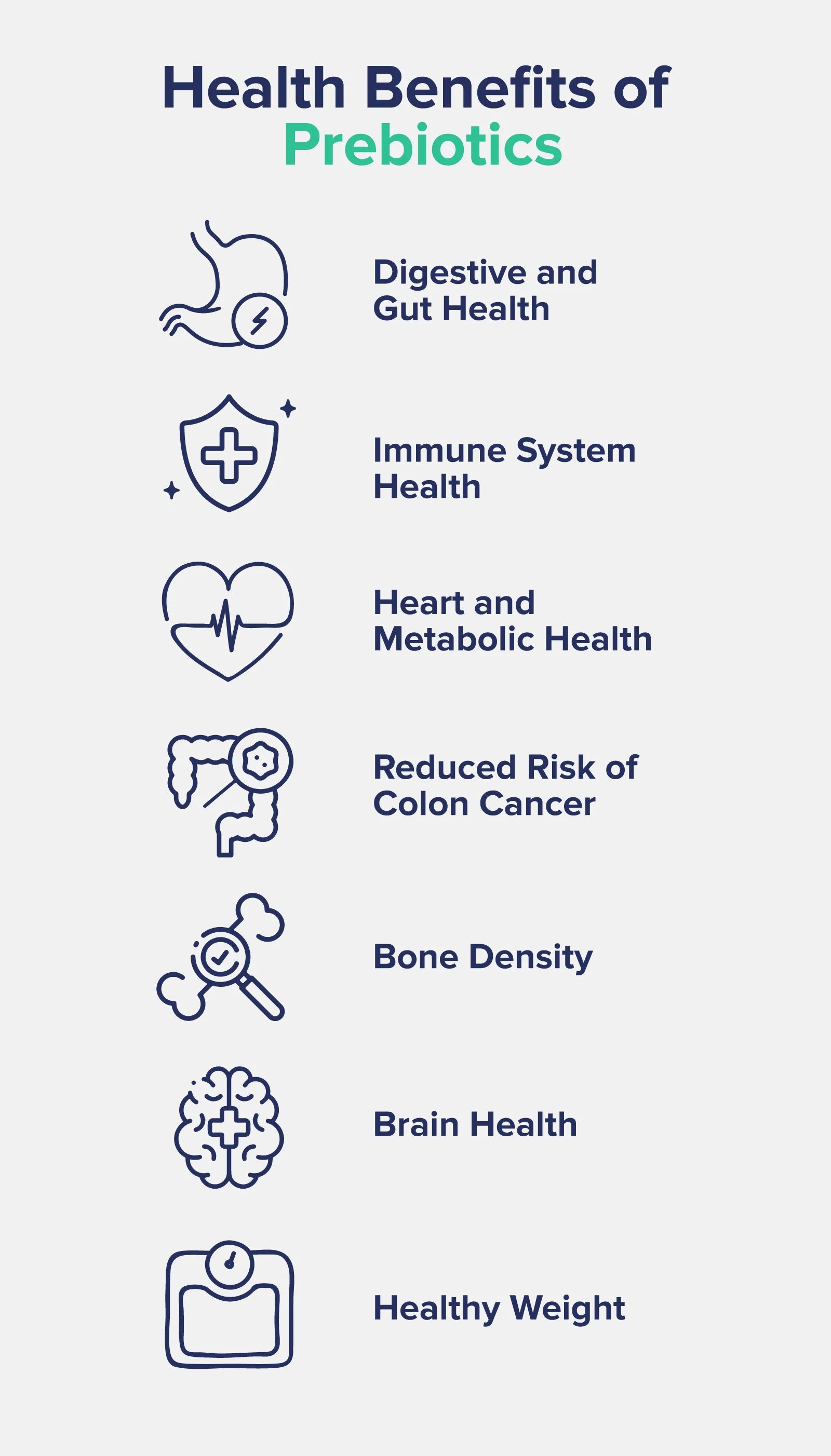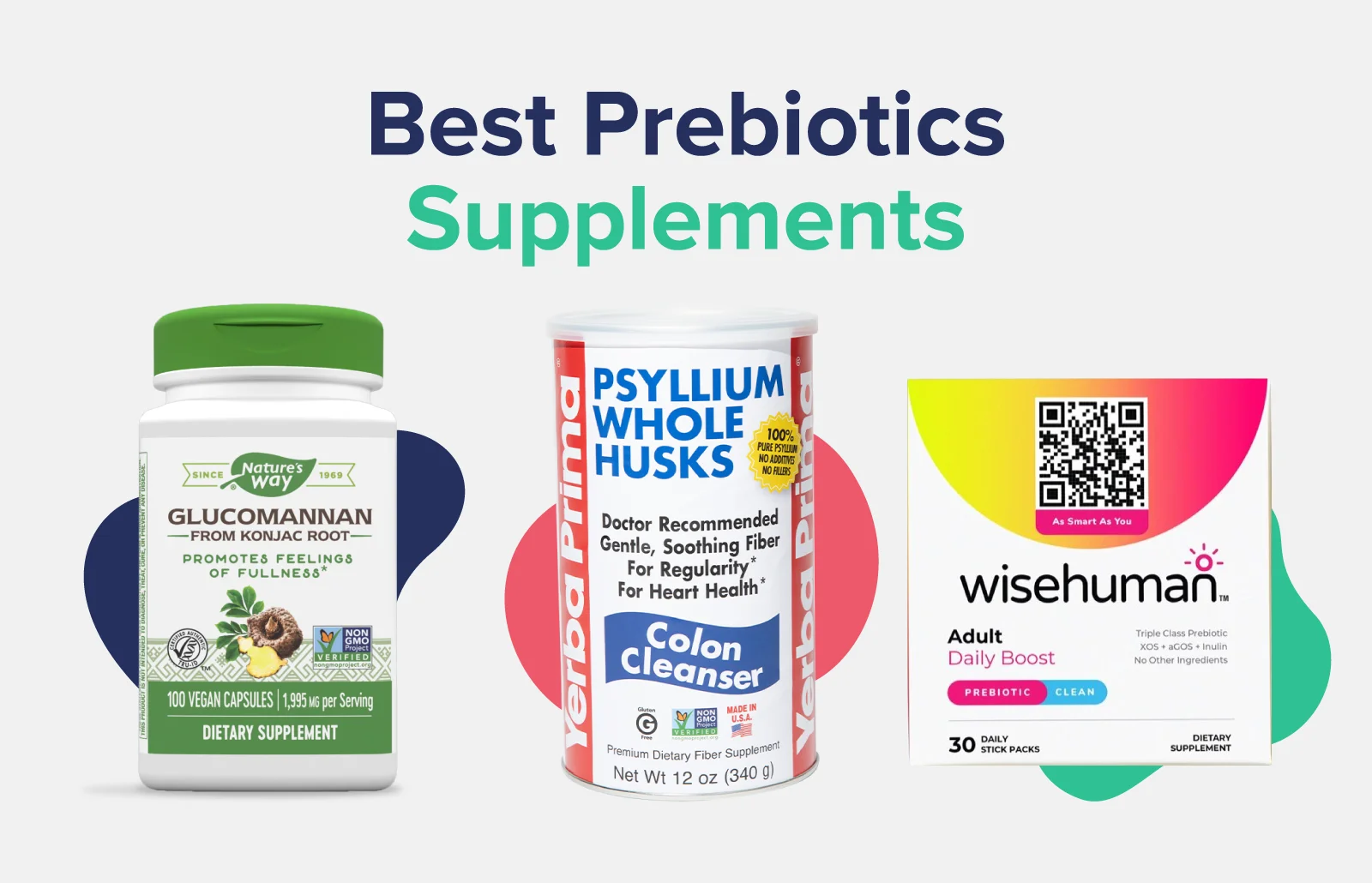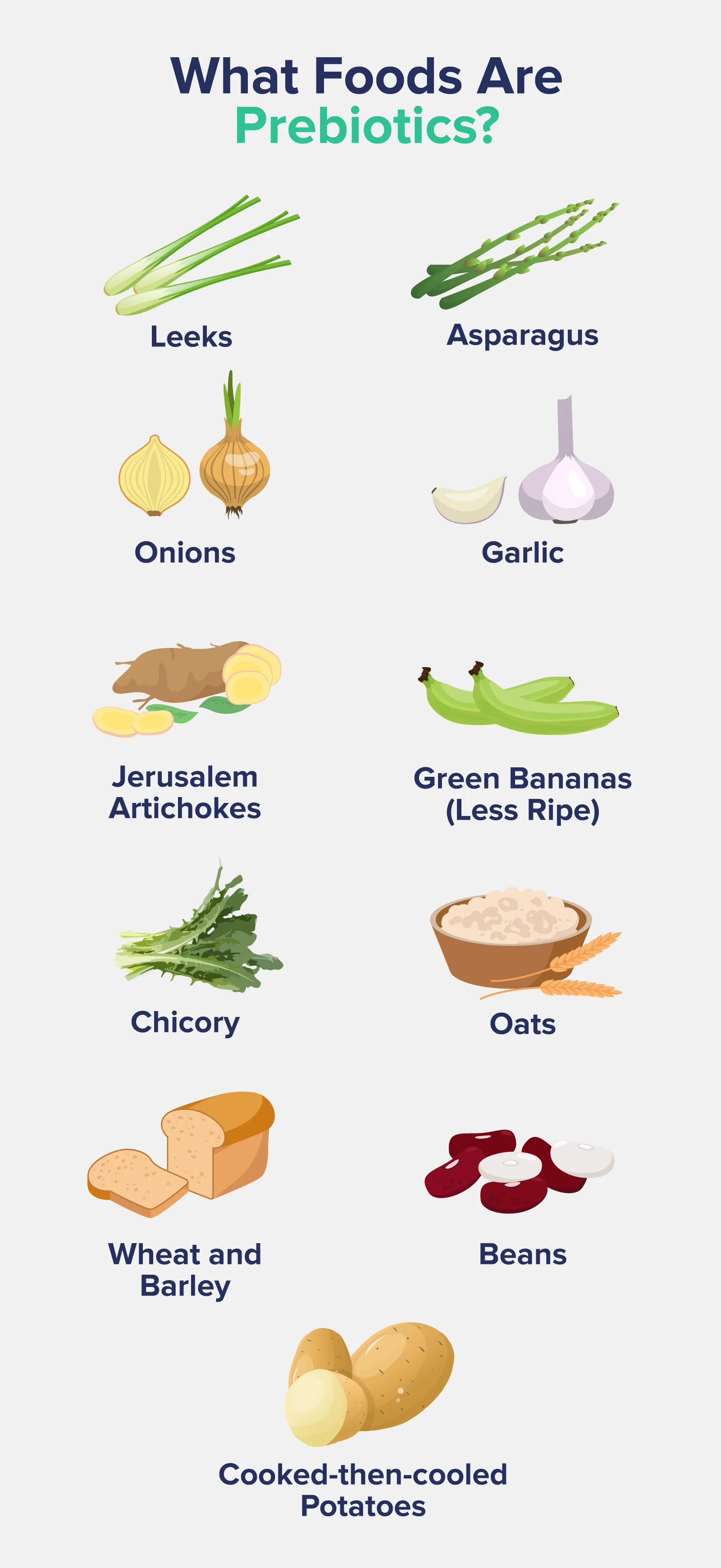Talk to a Registered Dietitian and use INSIDER20 for 20% off!
Talk to a real Dietitian for only $99: Schedule Now
This post contains links through which we may earn a small commission should you make a purchase from a brand. This in no way affects our ability to objectively critique the products and brands we review.
Evidence Based Research To fulfill our commitment to bringing our audience accurate and insightful content, our expert writers and medical reviewers rely on carefully curated research.
Read Our Editorial Policy
Our gut microbiome is (hopefully) loaded with beneficial bacteria that support our digestion and overall health—but they can’t survive and thrive without the help of prebiotics.
Prebiotics are the fuel that probiotic bacteria consume to keep living in our digestive tract, and their health benefits go far beyond the gut.
In this article, we’ll explore the top health benefits of prebiotics and their effects on the body, from brain health and bone density to irritable bowel syndrome and immune system function.
While prebiotics can certainly improve digestion, the potential health benefits of prebiotics also include immune function support, cardiovascular and metabolic improvements, weight management, and more.

There are two primary mechanisms by which prebiotics are thought to support digestive health:
For more details about these mechanisms, jump to this section:
Research shows that prebiotics may be beneficial for several digestive disorders or symptoms, including:
However, high doses of prebiotics (typically found more so in supplements than natural food sources) may trigger or worsen some digestive symptoms. This is because prebiotic fibers are fermented in the colon, leading to gas production.
People with IBS and IBD may need to experiment with dosages and types of prebiotic fiber to see which ones work for them.
It might also be more beneficial to consume prebiotics outside of disease flares (which could help to boost healthy gut microflora and strengthen the intestinal lining) but not during an active IBS or IBD flare.
This is seen in a small older study, where people with ulcerative colitis took the prebiotic isphagula (psyllium) husk for four months while in remission. Those taking the prebiotic had significantly greater clinical improvement rates and symptom management (69%) compared to the placebo group (24%).
It’s also thought that people with ulcerative colitis may benefit more from prebiotics than people with Crohn’s disease, the other form of IBD that tends to be more severe.
Research has shown that people with active Crohn’s disease who took FOS (fructooligosaccharides) prebiotics had significantly worse symptoms than those who did not.
Like IBD, high amounts of fiber (in any form) can cause painful digestive symptoms in some people with IBS.
Consuming prebiotics in food (rather than a prebiotic supplement with higher doses) may be preferred for people with IBS because foods typically have smaller amounts of prebiotics than supplements.
When it comes to IBD, consuming more prebiotics during remission periods may help reduce the risk of flare-ups in the future—but whether or not you eat or take prebiotics during flare-ups depends on your individual tolerance for fiber.
Healthy activity of SCFAs in the gut—especially butyrate—is associated with a reduced risk of colon or colorectal cancer.
In a review published in the journal Microorganisms, researchers state, “There is an increasing body of evidence describing the preventive effect of prebiotics on CRC [colorectal cancer].”
Butyrate has been shown to induce apoptosis (programmed cell death) of colon cancer cells and exhibit anti-tumor activity in laboratory studies, including inhibiting colorectal cancer cell proliferation.
However, in a systematic review of nine trials in humans, only lactulose (a synthetically derived prebiotic) was found to positively affect markers of colorectal cancer, as it reduced adenoma recurrence.
Other prebiotics, including resistant starch, inulin, and oligofructose, did not affect any biomarkers of colorectal cancer.
Several aspects of brain health and mood may be affected by prebiotics and SCFA production.
Some evidence suggests that neurodegenerative disorders like Alzheimer’s and Parkinson’s disease are, in part, modulated by SCFA activity and the gut-brain axis.
Although there is no available research in humans, studies with animals have shown that giving a form of butyrate improves memory in mice with advanced stages of Alzheimer’s disease.
In cognitively healthy people, one-time supplementation with the prebiotic inulin improved cognitive test scores four hours later, including greater accuracy on memory recognition tasks and improved recall performance.
Researchers speculate that SCFAs like butyrate benefit the brain and central nervous system by influencing neurotrophic factors like BDNF (brain-derived neurotrophic factor), which helps facilitate neurogenesis—the growth and maintenance of new neurons.
SCFAs also play a role in neurotransmitter communication and help to maintain the integrity of the blood-brain barrier.
Similarly, prebiotics are thought to support a healthy mood. One 8-week trial randomized adults with “moderate psychological distress” to consume a high-prebiotic diet, take supplemental probiotics, or combine both probiotics with a high-prebiotic diet.
They found that only the high-prebiotic food group experienced significant benefits to their mood, including reductions in “total mood disturbances” and improvements to anxiety, stress, and sleep.
The short-chain fatty acid propionate is metabolized and used by the liver, where it interferes with cholesterol production and can lead to healthier blood cholesterol levels.
This may be one reason why high-fiber diets are known to lower cholesterol levels and reduce the risk of cardiovascular disease.
Other ways prebiotics and SCFAs benefit heart health include improving blood sugar management (a leading risk factor for type 2 diabetes when dysregulated), reducing inflammation, and lowering blood pressure.
In a randomized controlled trial, women with type 2 diabetes were randomized to take inulin and oligofructose or a placebo for eight weeks. Those in the prebiotic group experienced several benefits related to cardiovascular health, including decreased fasting blood sugar, hemoglobin A1C (a standard diagnostic marker for type 2 diabetes or prediabetes), total and LDL cholesterol, and malondialdehyde (a marker of oxidative stress).
Acetate (one of the SCFAs) is used by our brains, muscles, and tissues. Studies suggest acetate benefits energy metabolism and is linked to appetite suppression and healthy body weight.
Because fiber is not digested, it is highly satiating—meaning it keeps us fuller for longer. The satiety factor (which is linked to appetite suppression) and the correction of gut dysbiosis are two potential reasons why prebiotics are linked to weight management.
One small study with 48 overweight adults found that taking 21 grams of fructooligosaccharide (FOS) prebiotics for 12 weeks led to significant weight loss compared to a control group.
The weight loss wasn’t much—the prebiotics group lost an average of 1.03kg (2.23 lbs)—but it was better than the control group, which gained weight throughout the study.
A review published in Nutrients summarized the results from 13 human clinical trials assessing prebiotic supplementation and weight.
Some key results found were that prebiotics of varying types increased satiety, reduced hunger hormones and hunger itself, decreased total caloric intake, and reduced body weight, body fat, BMI, and waist circumference.
These effects may be more pronounced in children, as seen in a randomized controlled trial assessing the impact of prebiotics on weight and appetite in children aged 7 to 12 with overweight or obesity.
In this research, children taking 8g of oligofructose and inulin daily for 16 weeks experienced greater feelings of fullness and reduced food consumption compared to the control group.
The kids taking prebiotics also had a significant reduction in BMI z-score (how BMI is measured in children) of -3.8% in the “per-protocol analysis”—which only includes the participants who strictly adhered to the protocol intervention—compared to a weight loss -0.35% in the placebo group.
Prebiotics generally do not have serious adverse effects, so supplementing with them may be a safer alternative to weight loss medications in children and adults.
Prebiotics are thought to enhance immune function, as short-chain fatty acids (primarily butyrate) act on various immune cells in the gut.
According to a review published in Current Opinions in Gastroenterology, short-chain fatty acids have been found to modulate the activity of several immune cells, including regulatory T cells, dendritic cells, and T lymphocytes.
SCFAs also strengthen the intestinal lining barrier and help produce antimicrobial peptides, which act as a physical line of defense against pathogens.
Short-chain fatty acids are known to increase calcium absorption in the intestines, enhancing bone mineral density or bone mineralization.
Non-digestible oligosaccharides, which include lactulose, galactooligosaccharides (GOS), fructooligosaccharides (FOS), oligofructose, and inulin, are currently thought to be the most promising prebiotics for bone health.As discussed in this 2018 review, supplemental prebiotics of varying types have been found in clinical trials to reduce bone resorption, increase calcium absorption, and improve whole-body bone mineral density and mineral content.
Prebiotics are a type of fiber we eat that good bacteria in our digestive system consume for energy.
Put simply, prebiotics are fuel for probiotics to grow and thrive in the gut.
For a technical definition, prebiotics are described as “nondigestible food ingredients that beneficially affect the host by selectively stimulating the growth and activity of bacteria in the colon, thus improving host health.”
According to the International Scientific Association of Probiotics and Prebiotics (ISAPP), the following criteria are used to classify a compound as a prebiotic:
Essentially, this means that prebiotics are types of dietary fiber that are not digested or absorbed by our digestive system and selectively stimulate the growth of beneficial gut bacteria.
Instead of being digested or broken down by our intestinal tract, prebiotics are consumed and fermented by various microbes in the colon (large intestine).
When our colonic bacteria consume prebiotic fibers, these healthy microbes can grow and thrive in the gut, which benefits the host (us!).
The breakdown of prebiotic fibers primarily stimulates the growth of Bifidobacterium and Lactobacillus, genera of beneficial bacteria known to improve gut health.
Different types of gut bacteria use carbohydrate-hydrolyzing enzymes to break down and ferment prebiotic fibers, producing hydrogen, methane, carbon dioxide, lactate, and short-chain fatty acids.
In turn, these fermentation byproducts (also known as metabolites) provide energy for certain gut microbes to use, allowing them to continue living and growing in the colon and improving our health in various ways.
A primary reason why prebiotics are so beneficial to the gut—and many other areas of the body—is because they lead to the production of short-chain fatty acids (SCFAs).
SCFAs are beneficial fermentation byproducts known as metabolites produced when our intestinal bacteria feed on prebiotic fibers.
The three primary SCFAs are acetate, propionate, and butyrate, accounting for 90% of SCFAs produced by gut bacteria.
The other 10% of SCFAs produced in the gut are less-researched but include succinate, pentanoate, malonate, and valerate.
Colon cells in the gut’s epithelium (the thin layer of epithelial cells making up our gut lining) prefer to use butyrate as a fuel source (even more than glucose).
Butyrate is an essential nutrient that helps colonocytes (colon cells) grow and thrive. It promotes normal colon cell growth, supports healthy mucus production, and strengthens the intestinal barrier.
Therefore, having enough available butyrate (which comes from eating prebiotic fibers) may be a critical factor in protecting against colonic disorders.
SCFAs also lower pH in the gut, thereby limiting the growth of harmful bacteria that cannot survive in lower-pH environments, and enhance mineral absorption, including calcium.
Prebiotic supplements can help to bridge the gap if you do not consume enough prebiotic foods.
A full list of our top-rated prebiotic supplements can be found in this article: Best Prebiotics for Gut Health.
A few of our favorites include:

Synbiotics are supplements that combine prebiotics and probiotics. They can be beneficial because prebiotics are an energy source for probiotics. Taking a synbiotic can maximize the synergistic effects of probiotics and prebiotics.
They can be particularly helpful if you don’t eat a high-fiber diet. In this case, choosing a synbiotic supplement instead of just a probiotic supplement can ensure that the beneficial microbes have enough fuel to consume and can survive and thrive in your gut.
Some of our favorite synbiotic supplements that combine probiotics and prebiotics include:
Prebiotics have been shown to be beneficial for several aspects of human health, including:
• Constipation
• Irritable bowel syndrome (IBS)
• Inflammatory bowel disease (more so ulcerative colitis than Crohn’s disease)
• Heart health and risk factors for cardiovascular disease
• Metabolism, appetite, and weight management
• Bone density and bone remineralization
• Brain health and markers of cognition
• Immune system functioning
• Reduction in the risk of colorectal cancer
Some people experience digestive problems from taking prebiotics, especially in supplement form or high doses. Prebiotic supplements may cause abdominal pain, gas, bloating, and diarrhea. However, in the long term, prebiotics are thought to benefit digestive health and improve symptoms such as these.
The top prebiotic-rich foods include:
• Leeks
• Asparagus
• Chicory
• Green bananas (less ripe)
• Jerusalem artichokes (sunchokes)
• Garlic
• Onions
• Certain whole grains like wheat and barley
• Oats
• Beans
• Cooked-then-cooled potatoes

Prebiotics are different than probiotics, so one is not necessarily better than the other. Rather, they complement each other.
While probiotics are live microorganisms that populate the gastrointestinal tract, prebiotics are a type of dietary fiber that feeds those colonic microbiota and stimulates the growth of healthy bacteria.
Probiotics cannot survive and thrive in the gut without prebiotics, but prebiotics won’t be consumed or used by anything if there are no probiotics in the gut. Therefore, one cannot fully exist (in the gut) without the other.
If good bacteria feed and grow from consuming prebiotics, you may wonder if prebiotics also feed bad bacteria.
As the definition of a prebiotic includes that “the compound selectively stimulates the growth and activity of intestinal bacteria and improves host health,” it’s likely that the answer to this question is “no” because a harmful bacteria would not improve our health.
However, even the healthiest gut in the world still contains some pathogenic bacteria, so you will never have a gut with only “healthy” bacteria. Plus, many bacteria are not solely “good” or “bad” and can act differently in different people or situations.
Overall, the answer is likely that some prebiotics might feed some unhealthy bacteria, but this will likely be overshadowed by the increase in known beneficial bacteria like Bifidobacterium and Lactobacillus. People with higher amounts of healthy bacteria will have no problem with some bad bacteria living in the gut, as they have greater levels of the good guys to overpower them.
No supplement or food will specifically lead to a loss of belly fat. That said, prebiotics (in food or supplements) may help prevent weight gain or support healthy weight management.
This is because prebiotics are types of fiber, meaning they increase satiety and help reduce appetite.
Some studies have shown that prebiotics lead to slight but significant reductions in weight, body fat, or BMI compared to placebo or control groups.